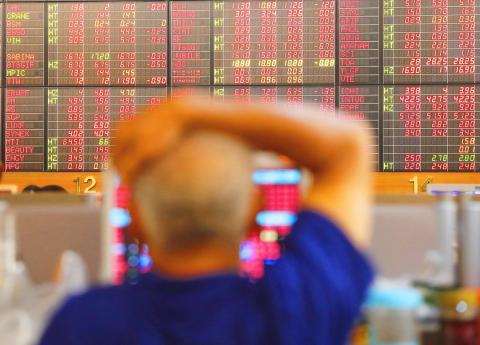Asian central banks yesterday moved aggressively to counter market upset, pumping liquidity into the financial system and discussing emergency action to fight the global economy’s biggest threat since the financial crisis.
The Bank of Korea is considering a special meeting to tackle wild swings in the foreign-exchange market, and Japan offered to provide as much as ¥2.2 trillion (US$20.78 billion) of liquidity in three different operations.
India pledged to use reserves to prop up its currency, which hit a record low yesterday, while China signaled a cut in its reserve ratio.

Photo: EPA-EFE
Yesterday’s market sell-off follows Wall Street’s worst day since 1987, as investors worry the global economy is plunging into recession.
Policymakers in Asia-Pacific have been acting for weeks to counter the economic blow from the coronavirus outbreak, but are now being pushed to do even more.
“Asian central banks will have to be more aggressive in easing policy and cutting interest rates,” Maybank Kim Eng Research Pte senior economist Chua Hak Bin said. “Conventional monetary policy may not be effective under this crisis of confidence and fear.”
Asian stocks later pared some of yesterday’s early losses, while US futures pushed higher.
Global equities are still heading for their worst week since 2008 after the US benchmark index fell 9.5 percent on Thursday.
Chua said that Asian central banks should coordinate action and unveil a program of buying exchange-traded funds to curb an indiscriminate sell-off across markets and “put a floor to this senseless panic.”
The Bank of Japan agreed to an emergency meeting with the finance ministry and regulators as officials try to calm markets with bond buying.
Australia’s central bank injected A$8.8 billion (US$5.53 billion) in its open-market operations, the most in at least seven years.
Indonesia’s central bank bought 6 trillion rupiah (US$407.18 million) of government bonds to prop up financial markets, adding to 8 trillion rupiah of bonds purchased on Thursday.
China has held its full fire as the increase in domestic virus cases slows, but now is preparing to inject more cash into the world’s second-biggest economy.
The central bank is expected to nudge bank lending by lowering reserve requirements in the days ahead, and a blitz of data on Monday is expected to show how much more stimulus might be needed.
A Reserve Bank of India official on Thursday said that it would tap a record US$481 billion in foreign reserves to keep the rupee stable, while also pursuing long-term repurchase operations and other liquidity tools.
Global central bank action in recent weeks has done little to calm market jitters as the virus fanned out and started to dent economies across Europe and in the US.
The US Federal Reserve and Bank of England surprised with emergency rate cuts, while the European Central Bank on Thursday pledged asset purchases and looser lending requirements.
“During this run-up, there seems to be almost a sense that aspirations of coordinated policies — by design or inadvertently — end up looking like competitive policies,” Mizuho Bank Ltd economics and strategy head Vishnu Varathan said. “Those things are not going to be helpful for the shape of the recovery.”
Japan, Indonesia and the Philippines are scheduled to hold interest rate decisions on Thursday, hours after the US Federal Reserve announces what is widely expected to be another cut to its benchmark interest rate.
Fiscal stimulus is also accelerating as confirmed cases of the virus surge globally. Governments have so far pledged more than US$130 billion in spending, tax breaks and other measures.

Intel Corp chief executive officer Lip-Bu Tan (陳立武) is expected to meet with Taiwanese suppliers next month in conjunction with the opening of the Computex Taipei trade show, supply chain sources said on Monday. The visit, the first for Tan to Taiwan since assuming his new post last month, would be aimed at enhancing Intel’s ties with suppliers in Taiwan as he attempts to help turn around the struggling US chipmaker, the sources said. Tan is to hold a banquet to celebrate Intel’s 40-year presence in Taiwan before Computex opens on May 20 and invite dozens of Taiwanese suppliers to exchange views

Application-specific integrated circuit designer Faraday Technology Corp (智原) yesterday said that although revenue this quarter would decline 30 percent from last quarter, it retained its full-year forecast of revenue growth of 100 percent. The company attributed the quarterly drop to a slowdown in customers’ production of chips using Faraday’s advanced packaging technology. The company is still confident about its revenue growth this year, given its strong “design-win” — or the projects it won to help customers design their chips, Faraday president Steve Wang (王國雍) told an online earnings conference. “The design-win this year is better than we expected. We believe we will win

Chizuko Kimura has become the first female sushi chef in the world to win a Michelin star, fulfilling a promise she made to her dying husband to continue his legacy. The 54-year-old Japanese chef regained the Michelin star her late husband, Shunei Kimura, won three years ago for their Sushi Shunei restaurant in Paris. For Shunei Kimura, the star was a dream come true. However, the joy was short-lived. He died from cancer just three months later in June 2022. He was 65. The following year, the restaurant in the heart of Montmartre lost its star rating. Chizuko Kimura insisted that the new star is still down

While China’s leaders use their economic and political might to fight US President Donald Trump’s trade war “to the end,” its army of social media soldiers are embarking on a more humorous campaign online. Trump’s tariff blitz has seen Washington and Beijing impose eye-watering duties on imports from the other, fanning a standoff between the economic superpowers that has sparked global recession fears and sent markets into a tailspin. Trump says his policy is a response to years of being “ripped off” by other countries and aims to bring manufacturing to the US, forcing companies to employ US workers. However, China’s online warriors